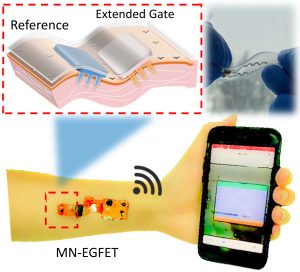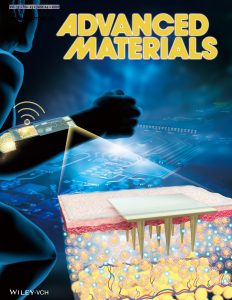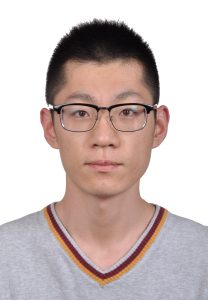Micro Tool, Mega Effect
Researchers at the Technion developed a flexible micro-needles platform that provides quick, continuous, and pain-free diagnosis
The COVID-19 pandemic, which has placed a heavy strain on health systems and medical teams, has highlighted the importance of smart technologies for continuous and real-time monitoring of people’s medical conditions. These are mainly wearable devices that monitor important physiological indicators while allowing the patient to go about his daily routine.
The journal Advanced Materials reports on a breakthrough by researchers at the Technion – Israel Institute of Technology that is expected to make a significant difference in this field. The breakthrough, which is featured as the journal’s cover story, is the result of research led by Professor Hossam Haick, postdoctoral fellow Dr. Youbin Zheng, and Ph.D. student Rawan Omar of the Wolfson Faculty of Chemical Engineering and the Russell Berrie Nanotechnology Institute. The system developed by Technion researchers is based on smart micro-needles, which are affixed to a sticker (band-aid) that attaches to the skin. The system continuously monitors the patient’s vital parameters and sends the data to the patient and his/her doctor.
Unlike standard medical needles, which are inserted through the skin, reaching blood vessels and nerves, consequently, causing pain and bleeding, the smart microneedles are short and thin and cross only the outer layer of skin. As a result, they cause only minimal discomfort. Despite their length, they monitor important physiological indicators because they reach the interstitial fluid under the skin’s surface and measure different biological and chemical components, including sodium, glucose, and pH level. The transfer of data to the doctor and the patient is done wirelessly through cloud and IoT (“Internet of Things”) technologies. This continuous monitoring, which allows the early detection of various physiological disorders, is essential for the prevention of diseases and other health complications such as heart and kidney diseases, infectious diseases, and more. It eliminates the need for conventional diagnostics such as blood tests that are currently carried out in the clinic, are painful for the patient, and do not provide online or immediate results.

The micro-needle array is attached to the body, reading, and measuring the health parameters from the interstitial fluid under the skin. The measurement results are sent immediately to the patient and doctor’s smartphone using cloud and IoT technologies
Two of the conditions that the new system monitors are hypernatremia and hyponatremia, both related to the level of sodium in the blood. The first means overly high sodium levels, while the second is sodium levels being too low. Both conditions can affect neurological function and even lead to loss of consciousness and coma. Early monitoring can prevent such deterioration. Sodium is an essential element found in blood cells and blood fluid and plays a vital role in transmitting signals in the nervous system as well as other biological functions.
“To adapt the technology to daily life,” Prof. Haick explained, “we have developed a unique band-aid made of a flexible and soft polymer that stretches and contracts along with the skin and therefore does not interfere with any action whatsoever. Since it is important for us that the system be available to everyone, we made sure to use relatively inexpensive materials, so the final product will not be expensive. The technology we’ve developed represents a leap in diagnosing clinical conditions and continuous physiological monitoring at home and in the clinic.”
Prof. Hossam Haick, head of the Nanomaterials-Based Devices Laboratories and Dean of Certification Studies at the Technion, is a leader in a variety of fields combining nanoelectronics, smart sensing, and other technologies for medical applications, some of which are adapted to the needs of the developing world.
Dr. Youbin Zheng completed all his degrees at Lanzhou University in China and came to Prof. Haick’s laboratory as a postdoctoral fellow.
Rawan Omar is currently a doctoral student in Prof. Haick’s laboratory and a fellow in the Ariane de Rothschild Women Doctoral Program – a program that supports outstanding female doctoral students towards integrating them into key positions in academia and Israeli society.
The study was carried out in collaboration with Prof. Miaomiao Yuan and Rongjun Zhang of the Eighth Affiliated Hospital, Sun Yat-Sen University in China.
Video demonstration of the device’s stretch and return to its original size:
For the full article in Advanced Materials click here






